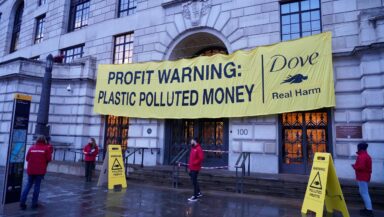Contact Greenpeace UK press office
press.uk@greenpeace.org

In the last six months both major parties have reversed key climate commitments, on the basis of cost. In September, Rishi Sunak announced that the Conservative government would be ‘rolling back’ on key net zero commitments on the basis that the transition was costly to ordinary people, despite research suggesting net zero can both help grow the economy and reduce cost of living pressures via measures such as home insulation. Meanwhile the Labour Party sharply cut back their green spending pledge of £28 billion a year, ostensibly because this clashed with their prioritisation of certain ‘fiscal rules’.
Failing to challenge austerity logic poses a significant risk to society at a time when economists from the LSE are warning that our public services and the wider economy are badly in need of investment, especially in the green economy. We know that ‘cutting the green crap’, as Cameron reportedly described his decisions to cut energy efficiency and renewables measures in 2013, has left our economy in a worse position. Even before the Ukraine war started, the decision added £2.5bn to the UK’s energy bills. Compounding the problem, the last few years have seen increased subsidies to environmentally damaging industries such as aviation and fossil fuels, when the former primarily benefits a small minority of the population, and the latter makes vast profits. Recent reports have highlighted that the wealthiest account for more carbon emissions than the majority of the population, while many of the biggest corporate polluters continue to see record profits while ordinary households are struggling to pay their bills.
In what may be the last major fiscal event before an election, Jeremy Hunt now appears to be considering a series of minor fiscal measures that could see wealth and polluting corporate activities being taxed more. Rumours include increasing the rate of air passenger duty for business class airfares, scaling back the ‘non-dom’ tax regime, extending the windfall tax on the profits of oil & gas companies, and scrapping tax breaks for second home-owners who rent out properties as holiday lets. While all of these measures would be welcome if they are actually delivered, they still fall significantly short from the scale of progressive tax reform needed to deliver a greener and fairer society, at home and abroad.
Taxing wealth and corporate polluters is hugely popular. For example, recent polling from YouGov found that 78% of voters support an annual wealth tax on those with assets worth over £10 million, while a significant majority of people in the UK think our country has a responsibility to support lower income countries to address climate change. For as long as the two major political parties fail to introduce tax and spend measures to meet the moment in terms of public demand and what’s needed to fairly and effectively tackle the climate emergency, they will risk fuelling growing public apathy towards mainstream politics ahead of the next election, and risk losing votes.
The following briefing provides several examples of where the wealth of the super rich and corporate polluting companies should be taxed more. It also provides an overview of why it remains an economic no-brainer for the government to borrow to invest, at scale, in green infrastructure.
Tax reform
Some of the measures we urgently need to deliver a just transition should be paid for through higher taxes on the richest individuals and the biggest corporate polluters. This could help fund things like reduced fares for public transport, green skills training for workers, and introducing a social tariff in the energy market to help provide a safety net for households struggling to afford their bills. It could also support communities in the Global South dealing with devastating floods and storms. This would allow everyone to benefit from the opportunities of the green transition, and be protected from the intensifying impacts of climate change.
Spring Budget policy recommendations
Some key policy recommendations are as follows:
Extreme wealth
Recommendation: Equalise capital gains with income tax rates, raising up to £15.2 billion a year. There is no reason why someone going to work should pay more tax on their wages than someone living off their investments.
- Oxfam estimated that globally the richest 1% were responsible for 16% of global carbon emissions, which is the same as the emissions of the poorest 66% of humanity.
- 1% of UK households own 25% of our wealth, and 70% of the British public support increased taxation of wealth, as do many millionaires and billionaires themselves.
- Equalising capital gains with income tax is a good starting point to make the tax system fairer and has broad, consensus support from academics and think-tanks across the political spectrum.
- It could raise up to £15.2 billion per year, as well as having the added benefit of simplifying the tax system.
The fossil fuel industry
Recommendation: Stop using public finance to support fossil fuel production and significantly increase taxes on the industry. This is money that should support households and workers with the net zero transition and help lower-income countries and communities to address climate impacts.
- Based on publicly available data, the Treasury provided around £3.35 billion in public money in the form of producer subsidies in 2022, while producers raked in record profits that still remain in their billions.
- In addition to ending public finance support for fossil fuel production, the UK should be permanently increasing the tax rate on fossil fuel producer profits to a minimum of 70% – the global average – after the Energy Profits Levy comes to an end in 2028; and properly taxing the revenues made by the fossil fuel industry’s trading activities through the supply chain.
The aviation industry
Recommendation: Introduce a progressive frequent flyer levy, designed to maintain access to air travel for all, while disincentivising it primarily for those who fly the most and capping demand overall. Using modelling by the New Economics Foundation (NEF), it is estimated that a frequent flyer levy could have raised around £4.09 billion in 2022.
- Aviation emissions account for around 7% of the UK’s greenhouse gas emissions and in 2018 were 88% above 1990 levels.
- Air travel is also one of the most unequal modes of transport, with roughly 50% of the population not participating in air travel in any given year, and 15% of the population responsible for 70% of all flights.
- A frequent flyer levy would replace Air Passenger Duty (APD) with an escalating charge applied to each flight over a one-year period, with the rate on each person’s first annual outbound flight being zero.
- It could cause the highest income 20% of the UK population to reduce flying by around 30%, while leaving the bottom half of the income distribution largely unaffected.
Borrowing to invest
The UK has suffered decades of under investment, consistently ranking the lowest in the G7. Expecting growth without investment is optimistic to say the least, therefore there seems to be a lack of coherence between the two major parties’ rhetoric on growth, and their policy proposals. As many economists know, private investment traditionally only follows public investment, and therefore to have a thriving economy, a healthy industrial base and a leading position in the green tech race globally, investing public money in the green transition is essential to encouraging private investment and growth. And an international race is well and truly underway for the jobs, revenues and technological advantage in key green technologies such as electric cars, green steel, renewable energy, battery storage and many others. Major blocs like the EU (Net Zero Act) and the US (Inflation Reduction Act) have created strong frameworks to deliver this investment.
The refusal to borrow to invest at any notable scale from both of the UK’s major parties risks repeating many of the same mistakes of the last decade that have ultimately weakened our economy and climate ambitions. The starkest example of a failure to invest public money may be Cameron cutting ‘the green crap’ in 2013 which led to:
- The collapse of government efforts to make UK housing more energy efficient from 2013 onwards. The UK now has some of the worst insulated homes in the UK.
- 9.6 million UK households are living in heat-leaking, poorly insulated homes and have incomes below the minimum required for an acceptable standard of living.
- Tens of billions of pounds a year in costs to the NHS and lost productivity, would be saved by investing £6bn annually in a national insulation programme, which is needed alongside urgent action to reduce hardship and address high fuel costs.
- The energy efficiency industry has been struggling for over a decade due to a lack of long term planning, and policy and funding changes over this political hot potato. As a result the Installation Assurance Authority has estimated that there are now fewer than 10,000 people involved in the industry and public-funded schemes in comparison to 54,000 a decade ago.
- An effective ban on the cheapest form of electricity – onshore wind.
- Unnecessary carbon emissions from inefficient homes using more gas. Heat in buildings is responsible for roughly a fifth of UK emissions.
- UK households exposed to soaring fossil fuel prices from Russia’s February 2022 invasion of Ukraine, intensifying the cost of living crisis in the UK relative to our European neighbours.
The government must learn from past mistakes and embrace the opportunities of net zero. Borrowing to invest in a green industrial strategy can resolve many of the UK’s major economic and social issues. Investing in warmer, insulated homes; cheaper, renewable energy; better transport infrastructure and jobs in the decarbonised industries of the future is crucial to strengthen our economy.
- Only last week a joint report from the CBI and ECIU found that ‘net zero businesses’ had grown at an annual rate ninety times that of the rest of the economy in 2023.
- Over 100 businesses, including Tesco, BT and Centrica, have all warned the Prime Minister that the UK risks being “left behind” if the UK waters down its Net Zero pledges, citing it as “the economic opportunity of the 21st century”.
- The government’s climate advisors (Climate Change Committee) highlight that Net Zero offers the potential for significant net employment creation in the UK, with estimates of between 135,000 and 725,000 net new jobs in low-carbon sectors.
- In housing alone, the economy could be boosted by £9.8bn by 2030 if the government was to deliver a strategy for decarbonising homes.
- Reviving a commitment to phase out petrol and diesel cars from 2030 could inject £4.2 billion into the economy.
Cutting spending in these areas has had severe costs for households and the state, as well as losing the UK ground in the global clean tech race. Additional costs incurred through growing intensity and frequency of extreme weather events only makes the case for green infrastructure investment stronger. Any political party keen on growth must invest in the green industrial revolution via borrowing and reforming our taxes for a stronger, fairer economy.
Contact



